Keynote Speakers SmartNets 2019
Prof. Moustafa Youssef
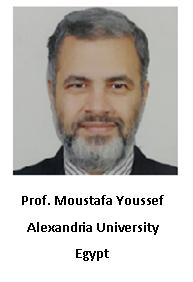
Title: Sensor-less Sensing: The Future of Ubiquitous Context-Awareness for the IoT
Abstract:
RF-based device-free (DF) context-awareness is an emerging field that enables the detection, tracking, and identification of entities that do not carry any devices nor participate actively in the sensing process using the already installed wireless infrastructure. The DF concept utilizes the fact that RF characteristics are functions of the surrounding environment. Changes in the received physical signals can be used to identify the presence of humans and objects, track them, as well as identify their characteristics. DF systems are attractive for many practical applications including intrusion detection and tracking, sensor-less sensing, low cost surveillance, home automation, and interactive visual display systems for museums and retail stores. Based on its characteristics, DF sensing fits the vision of ubiquitous computing, where each device in the environment can be potentially used to sense the human behavior.
In this talk, I will cover different DF systems used for intrusion detection, localisation, activity recognition, among others based on ubiquitous wireless technologies such as WiFi, FM, and cellular networks. The talk ends by a road-map for open research challenges and future directions challenges and future directions will also be discussed.
Biography:
Moustafa Youssef is a professor at Alexandria University and founder & director of the Wireless Research Center of Excellence, Egypt. His research interests include mobile wireless networks, mobile computing, location determination technologies, pervasive computing, and network security. He has tens of issued and pending patents. He is the Lead Guest Editor of the upcoming IEEE Computer Special Issue on Transformative Technologies, an Associate Editor for IEEE TMC and ACM TSAS, served as an Area Editor of ACM MC2R as well as on the organizing and technical committees of numerous prestigious conferences. He is the recipient of the 2003 University of Maryland Invention of the Year award, the 2010 TWAS-AAS-Microsoft Award for Young Scientists, the 2013 and 2014 COMESA Innovation Award, the 2013 ACM SIGSpatial GIS Conference Best Paper Award, the 2017 Egyptian State Award, multiple Google Research Awards, among many others. He is an ACM Distinguished Speaker, an ACM Distinguished Scientist, and an IEEE Fellow.
Prof. Abderrahim Benslimane
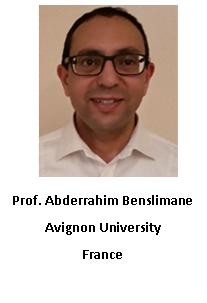
Title: Internet of Things: Monitoring and optimization challenges for Security issues
Abstract:
The emergence of the Internet of Things (IoT) is introducing more and more services and applications such as smart cities. IoT networks tend to experience unexpected communication problems during deployment, because resource-constrained embedded devices are unreliable by nature for a variety of reasons, such as uncertain radio connectivity and battery drain. Despite the fact that IoT networks are dynamic and vulnerable, the offered services need the continuous availability ofdefined network components.
The availability of devices, the reliability of communication, the Quality of Service (QoS), and security are all essential for the utilization of the IoT. Over time, the state of devices and the overall network may depreciate. This is due to the challenging and failure-prone nature of the IoT; consisting of a huge number of heterogeneous and resource-constrained things in terms of memory, communication, energy and computational capabilities. Furthermore, energy constraints impose hard duty cycles to maximise longevity, which in turn causes unreliable connectivity.
To ensure robustness in wireless networks, monitoring the network state, performance and functioning of the nodes and links is crucial, especially for critical applications. Safety-critical applications, such as a distributed fire- or burglar-alarm system, require that all sensor nodesare up and functional.
To that end, monitoring techniques for detecting, localizing and recovering network failures in IoTshould be significantly developed.
There are several tools and methods to monitor fixed networks and even wireless sensor networks. However, there is a lack of solutions for the Internet of Things with its complexity and heterogeneity. Monitoring can be passiveor active including using network tomography for beacon placements and probes optimization.
In this talk, we will introduce all the concept above. So, we will first introduce the Internet of Things,its challenges and the monitoring concept. We will present the Research motivations and objectives for the monitoring. After presenting the stat-of-the-art research on monitoring, we will present our theoretical solutions for monitoring IoT.
We target the optimization of IoT network monitoring for fault tolerance, security and quality of service purposes.
Biography:
Abderrahim Benslimane is Professor of Computer-Science at the Avignon University/France since 2001. He has been recently a International Expert at the French Ministry of Foreign and European affairs (2012-2016). He served as a coordinator of the Faculty of Engineering at the French University in Egypt. He obtained the French award of Doctoral supervisions (2017-2021) and he was attributed the French award of Scientific Excellency (2011-2014).
He has been as Associate Professor at the University of Technology of Belfort-Montbéliard since September 1994. He obtained the title to supervise researches (HDR 2000) from the University of Cergy-Pontoise, France. He received the PhD degree (1993), DEA (MS 1989) from the Franche-Comte University of Besançon, and BS (1987) from the University of Nancy, all in Computer Science.
He is EiC of InderscienceInt. J. of Multimedia Intelligence and Security (IJMIS), Area Editor of IEEE Internet of Things Journal, Area Editor of Wiley Security and Privacy journal and editorial member of IEEE Wireless Communication Magazine and Elsevier Ad Hoc. He is founder and serves as General-Chair of the IEEE WiMob since 2005 and of iCOST and MoWNetinternational conference since 2011. He served as a Symposium co-chair/leader in many IEEE international conferences such as ICC, Globecom, AINA and VTC. He was Guest Editor of many special issues. He participates to the steering and the program committee of many IEEE international conferences. He was Board committee member, Vice-chair of Student activities of IEEE France section/Region 8, he was Publication Vice-chair, Conference Vice-Chair and he is now Chair of the ComSoc TC of Communication and Information Security. He participates to the steering and the program committee of many IEEE international conferences.
His research interests are in development of communication protocols with the use of graph theory for mobile and wireless networks. Currently, he is working on the conception and performance evaluation of protocols for security in Internet of Things. Also, he works on multicast routing, inter-vehicular communications, Quality of service, energy conservation, localization, intrusion detection and MAC layer performance evaluation. He was awarded several best papers awards.
He is involved in many national and international founded projects. He was the head of Computer Networks and Multimedia Applications group (RAM) of the Computer Laboratory of Avignon from 2001 to 2009.
More info about his activities and all his publications can be found in http://abderrahimbenslimane.org/
Prof. Haitham S. Hamza
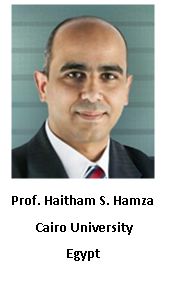
Title: A Closer Look at IoT Platforms
Abstract:
The Internet of Things (IoT) has been around for more than a decade now and appears to continue attracting the attention of industry and research communities. The holistic vision of IoT is to connect anything, anytime and anywhere.
Biography:
Haitham S. Hamza is the R&D Department Manager at the Software Engineering Competence Center (SECC) of ITIDA. He is currently managing the FP7 Project entitled REinforcing COoperation CApacity of Egypt in embedded ubiquitous computing (RECOCAPE) that is coordinated by SECC-ITIDA in a consortium that contains Tecnalia of Spain, VTT of Finland, and UNIBO of Italy. The project aims at transferring emerging IT technologies to the SME market in Egypt to enable and support innovation in ICT. Dr. Hamza has delivered several consultation services to IT companies in Egypt and abroad in various areas related to IT service management (ITIL), CMMI for development and services, and software architectures and reuse.
Dr. Hamza is an Associate Professor of Information Technology at Cairo University, Egypt. He received the B.S. (Honors) and the M.S. degree in Electronics and Communication Engineering from Cairo University, Cairo, Egypt, in 1998 and 2001, respectively. He received the M.S. and the PhD degrees in Computer Science from the University of Nebraska-Lincoln (UNL), USA in 2002 and 2006, respectively. He is a Fling fellow to the University of Nebraska-Lincoln. Dr. Hamza is the recipient of the Best Paper Award in the Optical Symposium of Broadnets in 2005. He is the recipient of the Graduate Teaching Assistant Award for the Collage of Art and Science in 2005, and the Outstanding Teaching Assistant Award in the Computer Science and Engineering department at UNL for Years 2003–2004 and 2004–2005. He also received the Graduate Research Assistant Award for the Collage of Art and Science in 2006.
He has more than 90 papers published in international conferences and journals including IEEE/ACM Transaction on Networking, IEEE/OSA Journal of Lightwave Technology, IEEE Globecom, IEEE ICC, IEEE PIRMC, SEKE, SPLC in various areas in IT including computer and communication networks, software engineering, and computer science education issues. His current research interests include software modularity theory and Internet-of-Things (IoT) cross-layer analysis and optimization.
Prof. Abdallah Shami
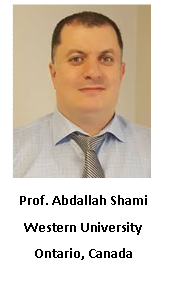
Title: Leveraging Cloud-based Virtualized Platforms Towards Quality-Driven Next-Generation Mobile Networks
Biography:
Abdallah Shami is a Professor at the ECE department at Western University, Ontario, Canada. Dr. Shami is the Director of the Optimized Computing and Communications Laboratory at Western University (https://www.eng.uwo.ca/oc2/). He is currently an Associate Editor for IEEE Transactions on Mobile Computing, IEEE Network, and IEEE Communications Tutorials and Survey. Dr. Shami has chaired key symposia for IEEE GLOBECOM, IEEE ICC, IEEE ICNC, and ICCIT. He was the elected Chair of the IEEE Communications Society Technical Committee on Communications Software (2016-2017) and IEEE London Ontario Section Chair (2016-2018).
Prof. Ali Idri
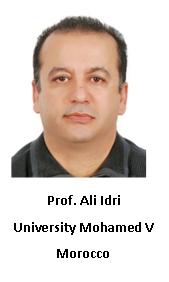
Title: Mobile Applications for Reproductive Health Services
Abstract:
The objective of the tutorial is to present the project NAS-USAID PEER 7-246 titled “Facilitating access to reproductive health services for refugee women in Morocco “. The objective of this project is to institute comprehensive reproductive health services dedicated to refugee women in Morocco including contraception, prenatal/obstetric and postpartum care services. The project will develop and evaluate a complete Information and Communication Technology-based solution to improve the quality of reproductive health services, which comprises a pregnancy monitoring mobile Personal Health Records (mPHR), an Electronic Health Records (EHR), a gamified contraception app, and a gamified postpartum app. In this pilot study, 50 pregnant and 20 non-pregnant refugees will use and assess the mPHR and the contraception and postpartum apps respectively while five gynecologists will use and evaluate the EHR.
The primary outcome measure is twofold and lies in: 1) the potential of the proposed Information and
Communication Technology based solution in improving access to reproductive health for refugee women; the potential is the compliance of the participants in terms of rating scores with the EHR, contraception and postnatal apps along with the mPHR for pregnancy monitoring; and 2) the core quality characteristics to be implemented in an ICT-based reproductive health solution to improve its usability and usefulness. The core quality characteristics will be determined by means of regression formulae associating the quality characteristics of the standards ISO 25010 and the participants’ rating scores.
Biography:
Ali Idri is a Full Professor at Computer Science and Systems Analysis School (ENSIAS, University Mohammed V, Rabat, Morocco). He received his Master and Doctorate of 3rd Cycle in Computer Science from the University of Mohammed V in 1994 and 1997 respectively. He received his Ph.D. in Cognitive and Computer Sciences from the University of Quebec at Montreal in 2003. He is the head of the Software Project Management research team since 2010 and the Chair of the department Web and Mobile Engineering for the period 2014-2020. He has a long experience in dealing with the use of machine learning techniques in software engineering and medical informatics. He was the principal investigator of several leading national and international projects. He was ranked at the 3rd position of the Top-Ten researchers in the field of software effort estimation according to the study “Research Patterns and Trends in Software Effort Estimation” published in the journal Information and Software Technology (Information and Software Technology 91 (2017) 1–21). He was also ranked 2nd of the Top-Ten researchers in doing Systematic Mapping Studies in Software Engineering according to the study “Landscaping systematic mapping studies in software engineering: A tertiary study” published in the journal of Systems and Software 149 (2019) 396–436 . He is the academic responsible of ERASMUS+, KA1 with the University of Murcia (Spain) since 2011. He is the responsible of the Erasmus+, Capacity Building “Including Students with Impairments in Distance Education” (InSIDE), Erasmus+ KA2, Coordinator: University of Macedonia, Greece. He is an Associate Editor of BMC Medical Informatics and Decision Making, JCR 2016, IF = 1.643 (https://bmcmedinformdecismak.biomedcentral.com/). He is an expert evaluator at the CNRST (http://www.cnrst.ma/index.php/fr/) which consists of evaluating the research projects handled by this organism. He is very active in the fields of software engineering, machine learning and medical informatics and has published more that 180 papers in well recognized journals and conferences such as Information and Software Technology, Journal of Software and Systems, International Journal of Medical Informatics, Computer Methods and Programs in Biomedicine and Journal of Applied Soft Computing.
Prof. Ahmed Meddahi
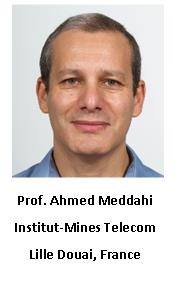
Title: SDN/NFV for IoT : Challenges and Perspectives.
Abstract:
VNF forwarding graph or service Function chaining (SFC), combined with Software defined networking (SDN) are an attractive research area and receive considerable attentions from both industry and academia. This is essentially due to its potential in improving the flexibility of provisioning and composition of Virtualized Network Functions (VNFs) to comply with industry and business-specific needs or requirements. A typical example is 5G multi-tenant network-slicing, in which one specific slice (ex. for IoT services deployment) independently defines a logical service chain which may compose a particular set of VNFs that differ from the other tenant slices (ex. for voD services deployment) . However, from a security and performance perspectives, there is a gap between high-level SFC policy specification and its enforcement at data plane with respect to the different QoS (delay, bandwidth, security …) This tutorial aims to provide a security and performance overview, from both research and practical perspectives, in the context of SDN/NFV based IoT and 5G use case.
Biography:
Ahmed Meddahi is a professor with IMT Lille Douai, Institut Mines-Telecom, France Ahmed received a M.S degree from University of Lille, a Ph.D. degree from the University of Evry and institut National des Telecommunications, France, and the HDR (accreditation to supervise research) degree from the University Paris VI (UPMC).
His current research is focused on distributed architectures, security protocols and management for Software-Defined Networking, Network Functions Virtualization. Ahmed has led or contributed to several research and industry projects as well as international collaboration projects. He participated to the creation of a startup specialized in VoIP. He is also involved in the organization of international conferences, by serving different roles (general, track and program chair, TPC members). Ahmed is the author or co-author of more than 40 research and technical papers (best paper award in the ACM SDN-NFV security 2017 conference) two books, and co-editor of Information and Communications security 2018.
